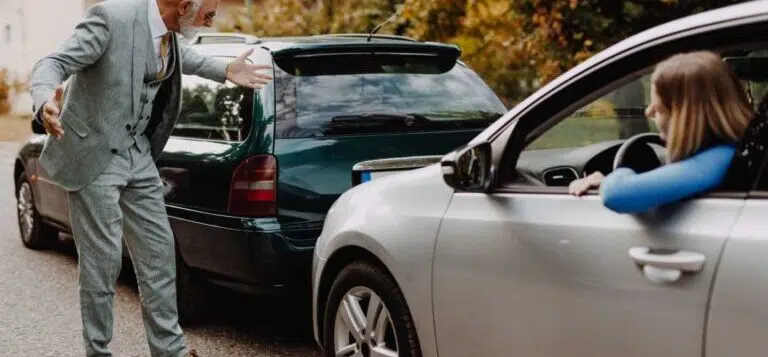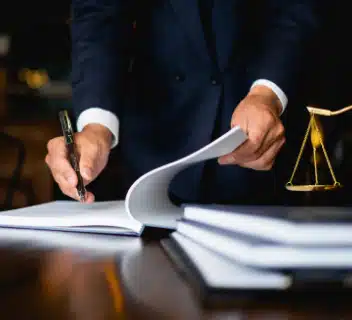What To Do After a Car Accident That’s Not Your Fault
If you’ve been injured in a car accident that’s not your fault, then you may be feeling confused and lost as to what to do to secure compensation that can cover your losses. After all, a serious accident can have significant impacts on your life — you can be left without the ability to work for an extended period of time, and you may have to undergo surgery and years of painful physical therapy. Trying to navigate the legal process while dealing with these issues can feel truly overwhelming.
We encourage you to connect with an experienced personal injury lawyer in our network for guidance. Contact 1-800-THE-LAW2 for a free legal consultation.
Of course, if you’d like to learn more about car accidents first, then read on! We’ll discuss some of the basics so as to clarify things for you.
How do I know whether I have a legitimate personal injury claim?
To determine whether you have a legitimate personal injury claim after a car crash/car collision incident, you’ll have to establish the following elements:
- You suffered injuries; and
- Those injuries were caused by the defendant’s negligent, reckless, or intentional misconduct.
If any of these elements are missing, then you do not have a legitimate, actionable personal injury claim. For example, if you didn’t suffer any injuries/losses after a near-miss car accident, then you can’t sue the defendant for damages, even if they were negligently speeding and driving while distracted.
It’s worth noting that — while seemingly straightforward — establishing liability using these elements is the central challenge in many disputes. This is the anchor on which many defendants will launch a defense argument. As such, you’ll want to consult a qualified car accident attorney for guidance.
What steps should I take after getting into a non-fault car accident?
After a car accident that’s not your fault, you should take the following steps so as to preserve your claims and maximize the likelihood that you’ll secure compensation down the line:
- Seek emergency medical assistance, if necessary. Failure to seek medical treatment in a timely manner can worsen your injuries (or result in new ones). The defendant may use this to argue that you should not be entitled to damages. So, if you have an emergency medical issue, prioritize your health first.
- Take photos and videos of the accident scene and your injuries. Assuming that you can stay at the accident scene, make sure to take photos and videos to document what occurred. This will help you counter any incorrect factual narrative presented by the defendant.
- File a police report. Filing a police report is crucial for documenting the incident and determining fault. It provides valuable evidence that can strengthen your insurance claims and protect your rights.
- Obtain the contact information of the responsible parties, as well as any eyewitnesses. You’ll want to engage in communications (through your attorney) with these parties later on, so don’t forget to do this!
- Avoid talking to third-parties until you’ve spoken to an attorney. It’s easy to slip up and make sensitive disclosures to insurance companies (whether it’s your own insurance company or the other driver’s insurance company) after an accident. These disclosures could undermine your claims and affect your ability to be compensated for your car accident injuries.
- Consult an attorney about what happened as soon as possible. Attorneys are not just courtroom advocates — their responsibilities and skills extend from beginning-to-end of the dispute process, including right after an accident. They can help you identify and preserve relevant evidence, handle communications with hostile parties (such as the at-fault driver’s insurer), and secure the treatment and medical procedures that you need (while keeping copious records of such).
Will an accident that wasn’t my fault affect my auto insurance coverage?
In most states, the law prohibits insurance companies from increasing your insurance rates if you were not at-fault for the crash, whether or not you actually submit a car insurance claim. That being said, insurance companies are not your allies or your friends — they will work tirelessly to increase their profit margins and undermine your claims. As such, their insurance adjusters will try to get you to disclose sensitive information so that they can argue that you were actually at-fault, and thus increase your rates (and potentially deny you benefits for your car accident claim, too).
If I’m partially at-fault for the accident, how will that affect my right to compensation?
If you’re partially at-fault for your car accident (and subsequent injuries), then your right to be compensated could be affected depending on the state law that applies to your accident dispute.
In some states, a doctrine called “pure comparative fault” applies. Under pure comparative fault, you are entitled to compensation even if you are partially responsible for your own injuries. In fact, you can recover even if you are 99 percent at-fault! That being said, your recoverable damages will be reduced by the percentage of fault that you contributed — so, for example, if your damages are $100,000 and you are 60 percent at-fault, then you can recover $40,000.
In some states, a doctrine called “modified comparative fault” applies. It operates the same as pure comparative fault, with one important difference: if you are 51 percent (or more) at-fault for the accident, then you are prevented from suing for compensation entirely. So long as you are 50 percent (or less) at-fault, then you can sue for compensation, though again, your damages will be reduced appropriately.
In a minority of states, a doctrine called “strict contributory fault” applies. Under strict contributory fault, you are prevented from suing for compensation if you are even one percent at-fault. This can seem severely restrictive, but with the aid of a skilled personal injury attorney, you may be able to circumvent the restriction by arguing that your contribution of fault is not causally linked to the injuries.
What damages can I potentially claim in a car accident dispute?
In a car collision case, you can claim as damages any losses that you sustained as a result of the defendant’s negligent, reckless, or intentional misconduct. These losses can be quite varied, and include:
- Lost wages
- Loss of earning capacity
- Medical expenses (i.e., accounting for the medical bills from comprehensive medical treatment)
- Loss of property
- Pain and suffering
- Loss of enjoyment of life
- Loss of companionship
- And more
Losses differ from case-to-case, depending on the particularities of your circumstances as a car crash injury victim. For example, if you are unemployed at the time of the accident, then your lost wages claim will be near-zero. If you are gainfully employed, however, and are forced to take several months off after the accident (due to your injuries), then you wage loss claim is likely to be substantial.
As an alternative example, someone who has “fragile bones” might sustain worse injuries, and have higher medical bills, than someone who is naturally strong and resilient. But it’s not the fault of the “weaker” person that they have a natural vulnerability. Even if they’re hurt in ways that seem extravagant for a normal person, they’re still entitled to sue the at-fault driver for their damages in full! It is the at-fault driver (not the victim) who has the burden of paying out damages for the harm they cause. This is something that many people in the general public don’t understand – the law is actually written to protect victims, by providing ample opportunity to sue the at-fault driver and maximize damages.
And don’t worry about “harming” them financially – the at-fault driver’s insurance company has a legal responsibility to step in and defend them in their lawsuit. So the other driver’s insurer will have to pay out (not them, directly) if you are compensated in your car accident case. The other driver’s insurance company is responsible for paying out the compensation.
Given these variations from case-to-case, it’s critical that you work with experienced personal injury lawyers who understand how to “build up” your damages claim and develop an airtight argument for said damages.
If I have a preexisting injury, how will that impact my claim?
If you have a preexisting injury, then your claim could be strategically impacted over the course of litigation. That’s because a core element of an injury claim is “causation.” If it wasn’t the defendant’s actions that caused your injury (i.e., you already had the injury beforehand), then you can’t sue them for damages, as they aren’t responsible.
To counter this defense argument (which will very likely be made by the at-fault driver’s insurer), you’ll want to work with your attorney to speak to medical experts who can identify specific, observable differences between your preexisting injury and the new injury — they can help you demonstrate that the two injuries are distinct from one another. The at-fault driver’s insurer will likely contest claims related to preexisting injuries, making it crucial to have clear medical evidence.
That being said, even if you have the “same” injury, you can still recover damages by claiming that the defendant’s actions “worsened” your preexisting injury — you’ll be able to recover for the losses stemming from the exacerbation of the preexisting injury. For example, if you have a preexisting back injury, but it’s worsened by the defendant’s actions to the point where you can no longer work a full-time job, then you can claim additional wage loss damages.
I’m worried that I won’t be able to afford a car accident lawyer. Are they expensive?
There’s nothing to worry about — in fact, if you’ve been in a car accident that is not your fault, then you can hire legal representation for no out-of-pocket cost whatsoever. That’s because most car accident attorneys work on a contingency fee basis.
Under a contingency fee dynamic, attorneys agree to advocate on your behalf in exchange for a percentage cut of whatever compensation they secure for you. You don’t have to pay anything upfront or out-of-pocket — so you can get started without any money. That’s right, you don’t have to be rich or financially stable to afford an attorney.
The best thing about contingency fee arrangements is that they incentivize attorneys to work efficiently, and to push hard to maximize your compensation total — the more that you get paid, the more they get paid. So there’s a strong incentive for your attorney to get you paid as much as possible!
Contact 1-800-THE-LAW2 for a Free Legal Consultation
If you’ve been injured in a car accident that’s not your fault, then you could be entitled to sue for damages under the law. That being said, navigating a car accident dispute isn’t always straightforward or easy — unique challenges are likely to present themselves as you move forward. That’s where an experienced car accident lawyer can help.
Contact 1-800-THE-LAW2 for a free legal consultation with a skilled local car accident lawyer in our network. During this initial consultation, you’ll have the opportunity to discuss your case in detail and learn more about the next steps you should take to secure compensation. And if you decide not to continue, that’s okay, too — there’s no obligation to keep pushing ahead with your dispute (or with the network attorney). So pick up the phone and call us today to get started!
We look forward to assisting you.




